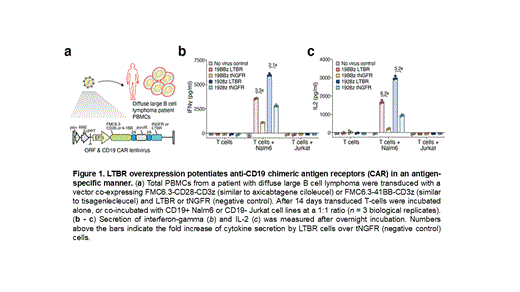Abstract
Despite recent therapeutic advances in the management of non-Hodgkin lymphoma (NHL), up to 50% of patients with diffuse large B-cell lymphoma (DLBCL) relapse after first line therapy, and for DLBCL patients who relapse within 12 months after subsequent stem cell transplant (SCT), the median overall survival (OS) is 6.3 months. Recently, chimeric antigen receptor (CAR) T-cell therapy has shown remarkable activity in relapsed DLBCL with complete response (CR) rate of 40% and 54% for the two of the FDA-approved CAR T-cell products, tisagenlecleucel and axicabtagene ciloleucel, respectively. However, at a median follow-up of 18 months, only 36% of patients treated with tisagenlecleucel remained in CR; with longer follow-up for axicabtagene ciloleucel the median progression free survival (PFS) was 5.9 months. Immune escape and immune evasion are primary mechanisms of CAR-T resistance; clearly improvements are needed to increase response rate and cure.
While CRISPR-based loss-of-function screens have shown promise for high-throughput identification of genes that modulate T-cell response, these methods have been limited thus far to negative regulators of T-cell functions, and raise safety concerns due to the permanent nature of genome modification. Here we identify positive T-cell regulators via overexpression of ~12,000 barcoded human open reading frames (ORFs). Using this genome-scale ORF screen, we found modulator genes which increased primary human CD4+ and CD8+ T-cell proliferation, including activation markers like CD25 and CD40L, and secretion of key cytokines like interleukin-2 and interferon-gamma. In addition, we developed a single-cell genomics method (OverCITE-seq) for high-throughput quantification of the transcriptome and surface proteome in ORF-engineered T-cells.
The top-ranked ORF, lymphotoxin beta receptor (LTBR), is typically expressed in a subset of myeloid cells but absent in lymphocytes. When expressed in T-cells, LTBR induces a profound transcriptional remodelling, resulting in increased resistance to exhaustion and activation-induced apoptosis, as well as upregulation of a plethora of proinflammatory cytokines, co-stimulatory molecules and antigen presentation machinery. In order to investigate the mechanism of action of LTBR, we developed an epistasis assay which allows for simultaneous gene knockout and LTBR overexpression in primary T cells. Thus, LTBR appears to induce both canonical and non-canonical NFkB pathways - but the phenotype observed in T cells is dependent only on the former.
Finally, we co-expressed several top-ranked genes, including LTBR, with FDA approved CD19-targeting CARs utilizing either 4-1BB or CD28 co-stimulatory domains. In line with previous results, co-expression of top-ranked ORFs increased proinflammatory cytokine secretion and cytotoxicity against CD19+ positive cancer cell lines. This functional improvement was also observed when top-ranked ORFs and CARs were delivered to T cells isolated from DLBCL patients as shown in Figure 1. Our results provide several strategies for improving next generation CAR T-cell therapies via induction of new synthetic cell programs which may optimize immune activation and enhance the efficacy of these important therapies, a high priority for patients with relapsed and refractory DLBCL and other lymphomas.
Mimitou: Immunai: Current Employment. Smibert: Immunai: Current Employment. Diefenbach: Bristol-Myers Squibb: Consultancy, Honoraria, Research Funding; IMab: Research Funding; Gilead: Current equity holder in publicly-traded company; Celgene: Research Funding; AbbVie: Research Funding; Janssen: Consultancy, Honoraria, Research Funding; Merck Sharp & Dohme: Consultancy, Honoraria, Research Funding; IGM Biosciences: Research Funding; Morphosys: Consultancy, Honoraria, Research Funding; MEI: Consultancy, Research Funding; Perlmutter Cancer Center at NYU Langone Health: Current Employment; Incyte: Research Funding; Trillium: Research Funding; Seattle Genetics: Consultancy, Honoraria, Research Funding; Genentech, Inc./ F. Hoffmann-La Roche Ltd: Consultancy, Honoraria, Research Funding. Sanjana: Qiagen: Consultancy; Vertex: Consultancy.


This feature is available to Subscribers Only
Sign In or Create an Account Close Modal